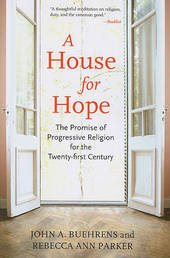
|
A House for Hope: The Promise of Progressive Religion for the Twenty-first Century
Paperback / softback
Main Details
| Title |
A House for Hope: The Promise of Progressive Religion for the Twenty-first Century
|
| Authors and Contributors |
By (author) John A. Buehrens
|
|
By (author) Rebecca Ann Parker
|
| Physical Properties |
| Format:Paperback / softback | | Pages:208 | | Dimensions(mm): Height 231,Width 155 |
|
| ISBN/Barcode |
9780807001509
|
| Classifications | Dewey:305.60973 |
|---|
| Audience | |
|---|
|
Publishing Details |
| Publisher |
Beacon Press
|
| Imprint |
Beacon Press
|
| Publication Date |
3 May 2011 |
| Publication Country |
United States
|
Description
An accessible discussion aboutthe religious progressives who are creating a movement far stronger than fundamentalism- a liberal religious renaissance based on an expansive love for life Hope is rising. The political tide in the United States has turned, and people across the country who have been working for years for social change and justice finally feel as though they aren't struggling alone. Yet for those who ground their social activism in progressive religious belief, it is all too easy to feel spiritually divided and isolated, daunted by the apparent dominance of religious fundamentalists in the media and politics. The impact of liberal religion is richer and more far-reaching than many know-a force for good that has inspired and supported two centuries of American social progress, from the abolition of slavery and the securing of women's rights to the present-day struggles for marriage equality, ecological responsibility, and global peace. In order to sustain our spirits and advance positive social change, progressive people need to claim the transforming power of our theological heritage. Authored by two leading progressive theologians,A House for Hopeaffirms that the shared hopes of religious progressives from many traditions can create a movement far stronger than fundamentalism- a liberal religious renaissance. Yet for it to flourish, progressive people must rediscover the spiritual sustenance available in the theological house our liberal forebears built, and embrace what our tradition truly holds sacred, as well as understanding what it rejects. In lively and engaging language,A House for Hopesuggests that liberal religious commitment is based on expansive love for life rather than adherence to narrow dogma. With chapters that reveal the political and personal relevance of the enduring questions at the heart of this theology,A House for Hopeshows how religious liberals have countered fundamentalists for generations, and provides progressives with not only a theological but also a spiritual foundation for the challenges of the twenty-first century.
Author Biography
John A. Buehrens was president of the Unitarian Universalist Association from 1993 to 2001 and is now minister of the First Parish Church in Needham, Massachusetts. He is coauthor of A Chosen Faith and author of Understanding the Bible. Rebecca Ann Parker is president of and professor of theology at Starr King School for the Ministry in Berkeley, California, and coauthor of Saving Paradise and Proverbs of Ashes. An ordained United Methodist minister, Parker has dual fellowship with the United Methodist Church and the Unitarian Universalist Association.
Reviews"A thoughtful meditation on religion, duty, and the common good."-Booklist "To some observers, religion and conservatism have become inextricably fused. But to [Buehrens and Parker], something new is emerging-a liberal religious renaissance."-Steven Levingston, The Washington Post "For nearly three decades, journalists and pundits have focused on the views and beliefs of the Religious Right and basically ignored members of America's mainline and liberal Protestant establishment. . . . [Buehrens and Parker] have set out to reintroduce people to the riches and bounties of progressive religion."-Frederic and Mary Ann Brussat, Spirituality & Practice "Buehrens and Parker begin with the life of service and work for justice and deepen it to show the implicit beliefs that it assumes and that are implicit in it. They show that progressive Protestants can be proud and articulate about their beliefs."-John B. Cobb Jr., coauthor of For the Common Good
|